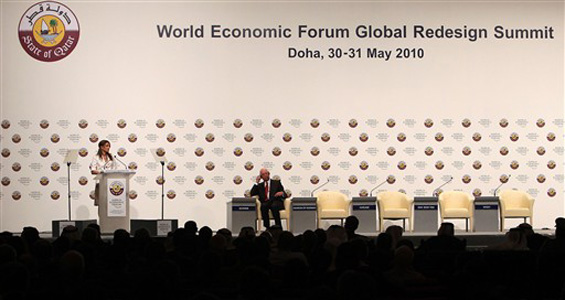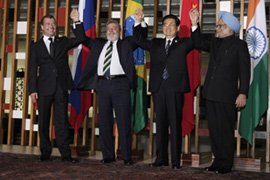‘Unity’ key to economic recovery
World Economic Forum calls for greater international solidarity and cooperation.

 |
| Jordan’s Queen Rania addresses the opening session of the WEF Global Redesign Summit [AFP] |
Multi-dimensional cooperation is necessary to address issues of global economic stability, delegates at the World Economic Forum Global Redesign Summit have said.
Following the economic crisis in Greece, national finance and G20 officials at a two-day conference in Doha, Qatar, stressed the need for greater solidarity, responsibility and accountability from states and non-state actors alike.
Keep reading
list of 4 itemsBoeing hit with 32 whistleblower claims, as dead worker’s case reviewed
US imposes new sanctions on Iran after attack on Israel
A flash flood and a quiet sale highlight India’s Sikkim’s hydro problems
Richard Samans, the managing director of the World Economic Forum, said that while multi-lateral institutions were outdated and needed reform, cooperation over global governance should not be restricted to state actors.
Rather, he said, the principles of the international economic system must be established within businesses, non-governmental organisations and even cultural institutions and that, through this, multi-lateral institutions such as the UN and the International Monetary Fund (IMF) can be redesigned with a state-core supplemented by other parties.
“This is a clarion call to inject the way we shape leaders, all actors, with the responsibility of their actions,” Samans said, adding that while accountability for the global system lies with all of us, states must champion the sharing of the burden of living in a co-dependent world.
Working together
Following the global economic crisis, euro zone central banks and the IMF have provided bailout loans of $140mn to Greece, in a move the 16 euro zone countries hope will prevent contagion to other nations and protect the euro.
However, Greece’s problems have already affected nations further afield than the euro zone, by, for example, weakening the euro against the US dollar and, in turn, dampening demand for US exports.
Cheng Siwei, the chairman of China’s International Finance Forum, said that increased cooperation is the only way countries can protect themselves against the risk of other nations’ mistakes or malpractice.
“The sovereign debt problem is a big problem. If this problem cannot be solved properly it will cause not only economic problems but also problems with social stability in those countries. So we encourage the European Union [and the] IMF to help those countries. But on the other hand we need to find a suitable mechanism to prevent and remedy those problems.
“Our suggestion is to provide loans to them because if they default on their debt it will be a big problem for them because they will have their rating reduced and that will cause a lot of problems. So we need to provide new debt to pay their old debt. On the other hand that they may recover by a suitable appropriate financial fiscal and monetary policy. Actually even China contributed to Greece through the IMF.”
Siwei said that the global economy can only fully emerge from recession if states act together to synchronise the raising of interest rates as a hedge against inflation and to reduce stimulus packages.
“In this case we have to have all the big countries act [together]. Because if China raises its interest rate all of the hot money will flow to China. So you cannot solve this problem of excess liquidity because if the money flows to China it will increase liquidity.
“So in this case you need to increase cooperation between the US, EU, Japan. I think sooner or later we need to increase the interest rate to cope with the possible inflation problem but we need joint action. Not only one country can solve that problem.”
Solidarity versus accountability
 |
| The forum stressed the importance of emerging economies [EPA] |
The onus placed on wealthier countries to bail out failing economies has caused consternation in the euro zone and the question of how international solidarity can be matched by accountability for financial malpractice remains.
Simon Zadek, a visiting senior fellow at the Centre for Government and Business at Harvard University, argued that dialogue between state and non-state actors can have a greater impact that censure.
“Using traditional governance systems [to provide accountability] is going to be near on impossible,” he said. “Otherwise you’ll recreate a UN-type body which is not the desired end.”
“Whereas a much more intimate engagement of non-state actors in at least the deliberative process, if not the decision-making process, around key political decisions will actually do more than formal accountability mechanisms.”
Bringing non-state actors into play on issues of accountability and responsibility in the global economic system is pertinent following the role of US bankers in providing unsuitable homebuyer loans, precipitating the global economic meltdown, and the threat of speculators eroding Greece’s finances further by betting on their debt.
New players
Alexandre Fasel, from the Swiss department of foreign affairs, said that while international institutions do need reform, new groupings have already developed which can provide a suitable response to these issues.
He maintained that existing institutions such as the UN and the IMF need to be strengthened because states recognise their legitimacy, but stressed the importance of new mechanisms, such as the G20 in giving a greater voice to increasingly prominent developing nations.
“The G20 was created because of a need for urgency,” Fasel said, arguing that when newer groupings and traditional institutions link up this provides a greater working symbiosis to aid economic stability.
The opening session of the forum found some agreement that the G8 group of developed nations still had a role to play in providing experience and leadership, while the G20 allowed emerging economies, such as China, Brazil, India and South Africa, to have a say.
Zadek, however, disagreed: “Despite what was said in the plenary this morning, I thought it was polite and wrong.
“I would say that the G8 doesn’t really have a very useful future apart from as a club of common interests and institutions on governments that don’t have a lot of autonomous decision making as compared to the G20.”
Siwei agreed, asserting that broader international cooperation is now inevitable.
The G8, he said, “cannot solve the global problems without the big developing countries like China, Brazil, South Africa, India”.
“So in my opinion the G20 will play a much more important role in the future.”